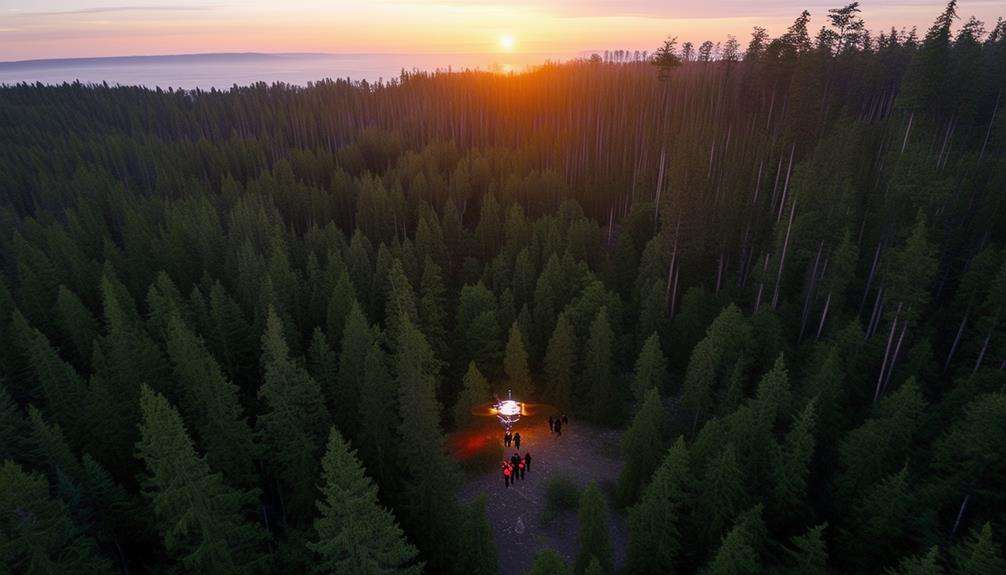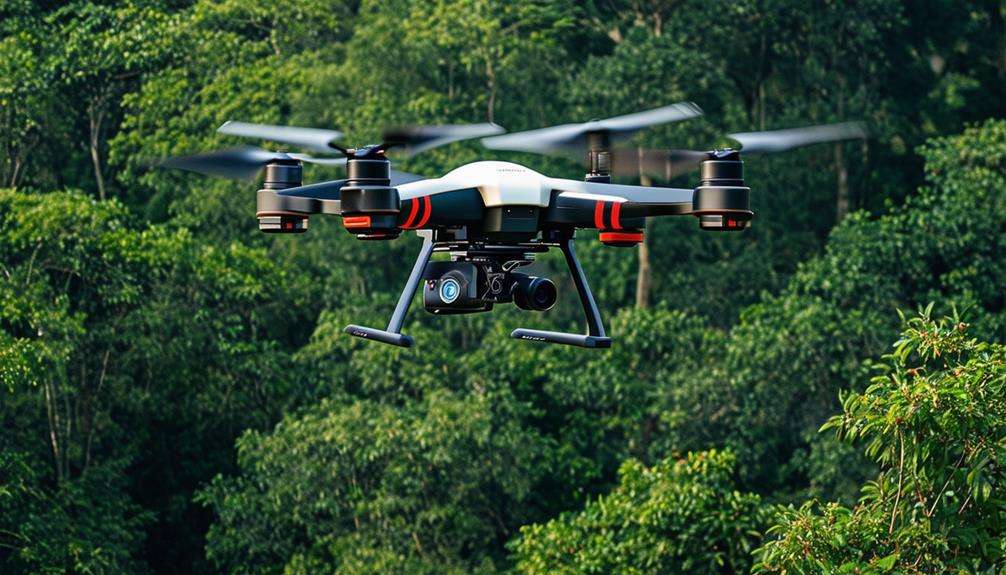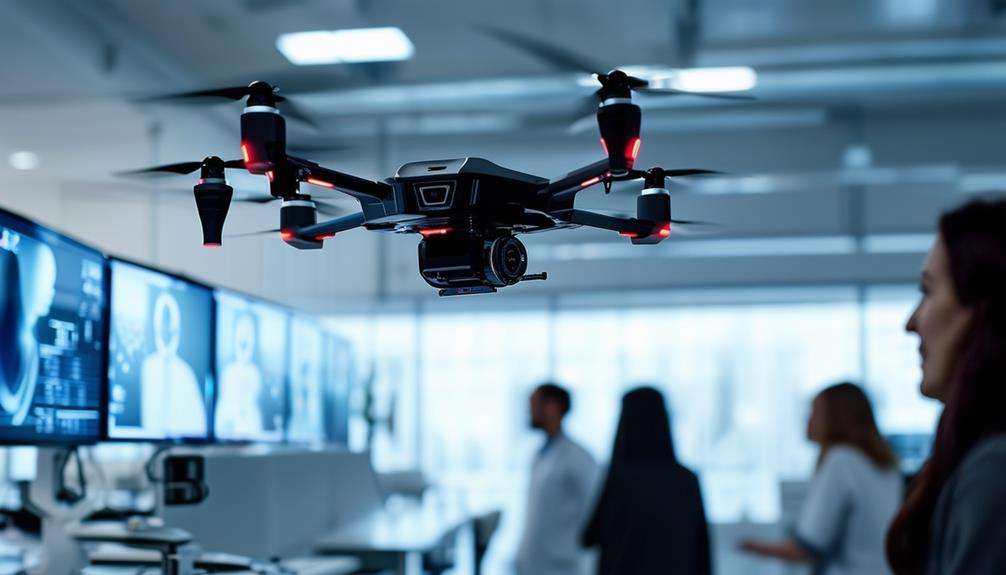How Do I Block Drones From My Property?
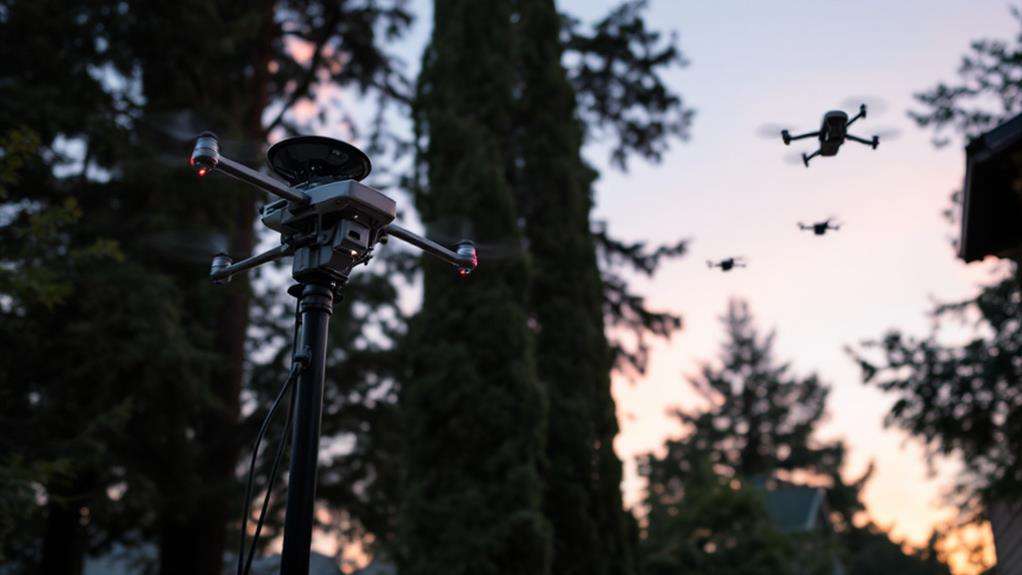
To block drones from your property, start by understanding legal regulations. Know your rights, such as reporting FAA violations if drones exceed altitude limits. Engage directly with operators to request they stop their intrusions. Implement physical barriers like tall fences and dense trees to obstruct views. Use technology solutions, such as detection systems, to track nearby drones and confuse their sensors with reflective surfaces. Report any issues to authorities with detailed documentation. Lastly, advocate for local laws to strengthen privacy protections. These strategies will empower you to protect your space while exploring additional insights on the topic.
Key Takeaways
- Install tall fences or privacy screens to obstruct drones' visibility and protect your property.
- Utilize drone detection systems to receive alerts when drones are nearby, enhancing your awareness.
- Plant dense trees or shrubs to disrupt drone signals and maintain privacy.
- Engage with local lawmakers to advocate for stricter drone regulations and privacy protections.
- Document and report any FAA violations or persistent drone nuisances to local law enforcement.
Understand Drone Regulations
To effectively manage drones around your property, you need to understand the regulations governing their use. The Federal Aviation Administration (FAA) classifies drones as aircraft and strictly regulates their operation. This includes maintaining altitude limits of 400 feet and enforcing restrictions near sensitive areas like airports and military installations. It's also vital to note that the FAA's Remote Identification requirements will enhance tracking capabilities, aiding in the enforcement of regulations. As a property owner, it's crucial to be aware that you can't forcibly remove a drone from the airspace above your property, as they are considered private property under FAA jurisdiction.
Understanding both federal and local laws is essential. Local laws might add extra restrictions on flying drones, which can impact how they're operated near your property. Violating FAA regulations, such as flying drones recklessly or above the designated altitude, can result in fines, legal action, or criminal charges against the drone operator. Therefore, staying informed about these rules helps protect your privacy and your rights.
If you suspect a drone is violating regulations, you can report it to the FAA. They handle investigations into unauthorized flights over private property and other non-compliance issues. Being proactive ensures the safety and privacy of your property.
Know Your Legal Rights
Understanding your legal rights regarding drones is crucial, especially given their frequent use in today's world. As a property owner, it's important to know that drones are considered aircraft under federal law and can't be forcibly removed from your property. Interfering with a drone's operation, such as using nets or jammers, is illegal and could lead to criminal charges. Instead, focus on understanding FAA regulations and local laws to protect your interests. It's equally important to be aware that local municipalities may impose additional regulations beyond state laws, which could affect how drones operate in your area. If drones are flying over your property and causing privacy violations, you have the right to report FAA violations. This is particularly relevant if a drone's flight exceeds altitude limits or if there are unauthorized landings. However, simply finding drones annoying isn't enough for a formal complaint. Proper documentation of each incident can strengthen your case when reporting to the FAA or local authorities.
Local laws may impose additional restrictions on drone operations, so staying informed about these can be beneficial. By knowing your legal rights and documenting violations, you can take actionable steps without risking legal repercussions. Remember, while you can't interfere with a drone directly, reporting violations is a key tool in defending your property rights.
Contact Drone Operators
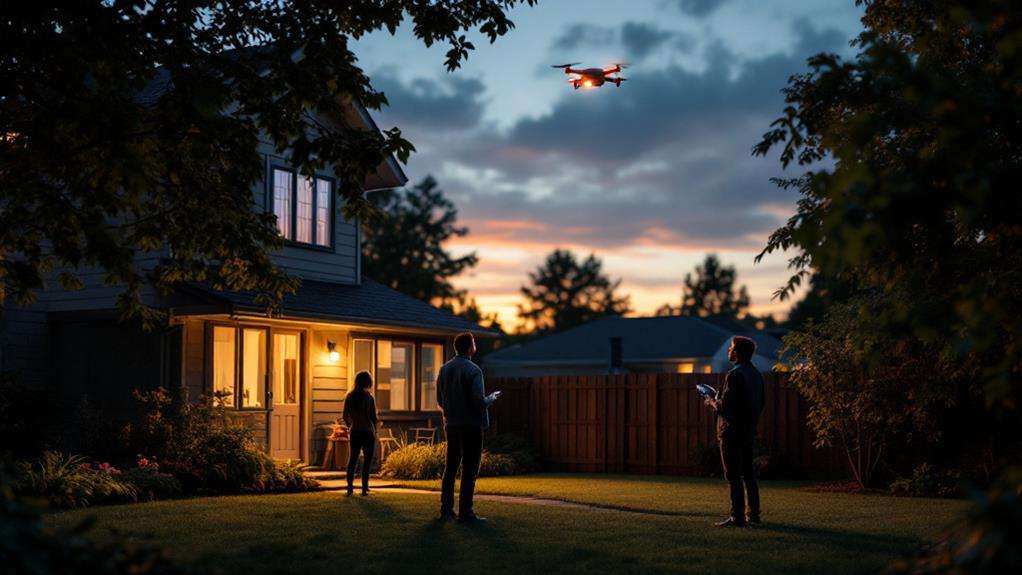
While understanding your legal rights is important, directly contacting drone operators can often resolve issues more effectively. If you spot a drone over your property, try to locate the drone operator. They're usually nearby, maintaining visual line of sight with their drone. Often, operators aren't aware they're intruding on your property rights, so a polite request to stop might be all you need. Clearly explain the disturbance and how it affects your privacy.
Make sure to document instances of drone activity. Record dates, times, and any identifiable features of the drone. This information can be valuable if you need to escalate the issue. If the operator ignores your requests or the problem continues, consider reporting drone activity to local law enforcement or the FAA. They can investigate further and ensure compliance with regulations.
For persistent or widespread drone issues, engage with community organizations or neighborhood watch programs. They can offer additional support in addressing ongoing drone issues. Collaboratively, you can develop strategies to protect your property rights. Remember, addressing the problem early and peacefully is often more effective than letting frustration build. Be proactive and use all available resources to safeguard your privacy.
Report Drone Violations
Occasionally, you'll encounter situations where reporting drone violations becomes necessary to protect your privacy and property rights. If you suspect a drone is flouting FAA regulations, you should report these drone violations to the FAA's Local Flight Standards District Office. Provide detailed information like the time, location, and nature of the incident. Document incidents meticulously—photos or videos capturing the drone and its registration markings can serve as vital evidence. This strengthens your case when you approach the authorities.
Persistent drone activity that feels like a nuisance or trespassing warrants a call to local law enforcement. They can offer assistance in addressing the issue and may intervene if necessary. Privacy violations due to drone surveillance are serious concerns. Filing a complaint with local authorities ensures these violations are investigated, and appropriate actions are taken.
Engaging with neighborhood watch programs is another effective strategy. These programs can help monitor drone activity and gather information to support your reports. They also raise community awareness about potential drone violations. Remember, taking these steps helps not only your situation but also sets a precedent for protecting neighborhood privacy rights.
Implement Physical Barriers

To effectively protect your property from unwanted drone surveillance, consider implementing physical barriers. Start by installing tall fences or privacy screens. These structures can obstruct drone visibility and help deter unauthorized aerial surveillance. Not only do they provide a visual block, but they also add an extra layer of security to protect your privacy.
Planting dense trees or shrubs around your property is another effective strategy. These natural barriers can disrupt drone signals, making it harder for drones to monitor your activities. Over time, as these plants grow, they'll offer increased protection against intrusive aerial prying.
For a more hands-on approach, consider using drone nets. These can physically capture drones that attempt to enter your airspace. However, be mindful of the legal implications involved with this tactic.
Reflective surfaces, such as aluminum foil or mirrored materials, can also play a role in your defense strategy. They can confuse drone sensors and potentially deter them from flying over your property. Lastly, noise-producing barriers like wind chimes or outdoor speakers can scare away drones by disrupting their operational environment, further protecting your privacy. By combining these methods, you can effectively safeguard your property from unauthorized drone intrusions.
Use Technology Solutions
Beyond physical barriers, embracing technology solutions can further enhance your property's defense against intrusive drones. Start by installing drone detection systems. These systems provide you with alerts for drones when they're nearby, allowing you to take immediate action to protect your privacy. You might also consider using reflective surfaces like aluminum foil or mirrored film. These can confuse drone sensors, disrupting their ability to surveil your property.
Privacy screens and clever landscaping, such as dense trees or tall shrubs, can effectively obstruct aerial views, limiting how much of your property is visible from above. This natural approach not only beautifies your space but also acts as an effective deterrent against prying eyes.
Additionally, staying informed about drone activity in your area is crucial. Download drone activity apps to track potential incursions and be prepared for any unwelcome visitors. For those interested in more sophisticated options, advanced anti-drone technologies, such as signal disruption devices, are evolving. However, ensure any technology you use complies with local laws to avoid legal issues. By combining these tech solutions, you can significantly bolster your property's security against unwanted drone surveillance.
Advocate for Local Laws
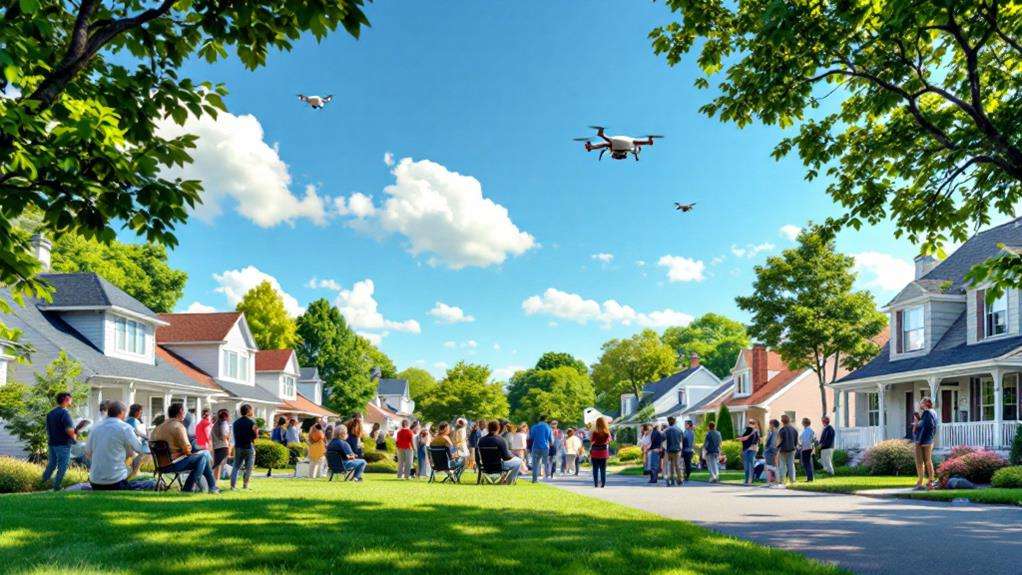
Engaging with your local lawmakers is a powerful step in advocating for stronger privacy protections against intrusive drones. By raising awareness of privacy and property concerns associated with drone usage, you can encourage the development of regulations that safeguard residents' rights. Start by organizing community meetings, where you and your neighbors can discuss the impact of drone operations on your privacy. These meetings provide a platform for expressing concerns about drone surveillance and proposing solutions.
Join special interest groups focused on drone regulation to bolster your lobbying efforts. Collective actions are more likely to sway policymakers to consider legislative proposals that restrict drone activities above private properties. Supporting such proposals can lead to enhanced privacy protections for homeowners. Remain proactive by regularly communicating with your local representatives about ongoing drone issues. Keeping these concerns on their agenda increases the likelihood of policy changes or new ordinances being introduced.

